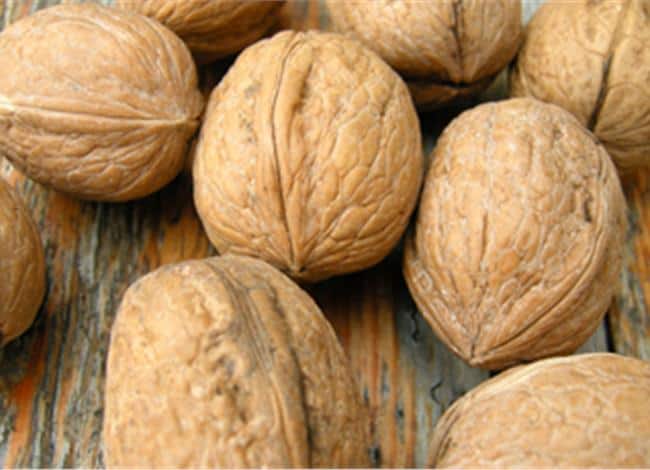
Nuts are high in heart healthy fats, fiber, protein, antioxidants, minerals, and are not to be feared because of their higher calorie content. Besides having a nut allergy, most people can benefit from having nuts as part of a healthy diet.
Nut consumption has been associated with lowering risk for heart disease, gallstone, diabetes in women and possibly lowering risk for some cancers and lowering general inflammation in the body.
Walnuts in particular are very high in antioxidants compared to other nuts, according to Dr. Joe Vinson, researcher from the University of Pennsylvania Scranton (1).
How many walnuts should you eat per day?
Most studies have shown a benefit of eating between 1 and 1 1/2 ounces of walnuts per day.
Not only are walnuts superb for heart health, they may also be beneficial for brain function and may help with weight loss or maintenance.
Benefits of eating walnuts
1 – They help fill you up
An ounce serving of walnuts provides just under 200 calories with most of these calories coming from poly and monounsaturated fats. A serving also provides about 4 grams of protein, 2 grams of fiber.
The combination of fats, protein and fiber help keep you feeling satisfied after you eat them.
Because of this, eating a serving of walnuts before a meal may help you eat less at the actual meal time and later in the day.
2 – Won’t pack on the pounds
Won’t eating walnuts increase risk for weight gain since they are so calorically dense? Not according to research. A 2011 review article (2) found eating nuts was not associated with a higher risk for weight gain.
A 2005 study (3) looked at the impact of eating 12% of calories from walnuts and the effect it would have on weight gain in study participants over 6 months. Participants in this study ate a controlled diet with walnuts for 6 months a controlled diet without walnuts for 6 months.
The walnut diet had more calories than the other control diet.
Researchers found even though the walnut diet had more calories, there was not a significant amount of weight gain associated with this high intake of walnuts for 6 months.
In fact, some research studies have also found nut consumption may even help with weight loss.
3- Walnuts are a source of omega 3’s, vitamins and minerals
Walnuts have the highest amount of omega 3’s compared to other nuts. A one ounce serving of walnuts provides about 2.5 grams of alpha linolenic acid (ALA) (4).
Most Americans tend to not get enough omega 3 fatty acids in the diet and too many omega 6 fatty acids.
Research studies continue to uncover the health benefits of getting adequate amounts of omega 3’s in the diet, and eating some walnuts before a meal can help boost your intake of this essential fatty acid.
In addition to omega 3’s, walnuts are a rich source of antioxidants, vitamins and minerals. Walnuts are a good source of magnesium and phosphorus (5).
The majority of Americans do not get the recommended intake of magnesium through their diet, so eating walnuts before meals, or any time, can help you reach the recommended daily intake of magnesium.
A serving of walnuts also provides 25% Daily Value (DV) for copper, 4% DV for iron and 2% DV for calcium.
4 – Important for heart health
One of walnuts’ major health benefits is associated with promoting heart health. Nuts are a source of antioxidants and can protect cells from oxidation. Limiting LDL cholesterol from getting oxidized is considered an important risk reduction for heart disease.
Besides being a rich source of omega 3’s, walnuts in particular are high in a specific antioxidant called ellagic acid. This antioxidant has been shown to have strong anti-inflammatory effects (6).
Another reason walnuts are important for heart health is they can have a positive influence on cholesterol levels. Eating more walnuts has been shown (7) to be associated with a high level of HDL cholesterol. HDL cholesterol is considered the “good” cholesterol, and having high levels can help lower risk for heart disease.
A 2009 review article (8) concluded eating a high amount of walnuts could help lower LDL cholesterol. Having lower LDL cholesterol levels with high HDL cholesterol levels is considered good for heat health.
Walnuts are beneficial for heart health because they are a rich source of antioxidants that can help protect cells from damage and specifically LDL cholesterol from getting oxidized. Some studies suggest walnuts may also help increase beneficial HDL cholesterol and lower LDL cholesterol.
5 – Walnuts may help you live longer?
Could eating walnuts before a meal or at other times of the day actually help you live longer?
Maybe according to some research studies. Some epidemiological studies have found an association between eating nuts and lowering risk of major chronic diseases.
In fact, some large studies have even found an inverse association between nut consumption and risk of dying from any cause. This loosely means the higher the nut consumption people had in these research studies, the lower the risk of dying even when other risk factors were taken into account.
Those who ate nuts every day of the week had about 20% lowered death rate (9).
However, a 2013 review article (10) points out these research results show an association between nut consumption and death rate, not a causal impact.
Just because you eat nuts every day won’t guarantee you’re going to live longer. There may be other factors lowering the rate of death in people who have a high nut intake, so more research is needed.
Conclusion
Walnuts are a rich source of omega 3’s, antioxidants and many minerals. In fact, walnuts have the highest source of omega 3’s compared with other nuts.
Even though they are considered fairly high in calories, eating walnuts or other nuts is not associated with increased risk of weight gain.
Eating walnuts before a meal can help fill you up and keep you feeling satisfied after eating. Many studies have shown eating walnuts can have a beneficial effect on heart health, and eating walnuts or other nuts everyday has been associated with a lowered death rate.
How many walnuts should you eat per day? Most studies have shown a benefit of one to one and a half ounces of nuts per day.











hemalatha says
very nice.
please tell me exactly how many should be taken daily and when
i crossed menopause 2 years over i am feeling always tired and for the past 20 years i am suffering from insomnia. still i am having 7 years of service but i am feeling to give resignation.
u please guide me how to be very active always.